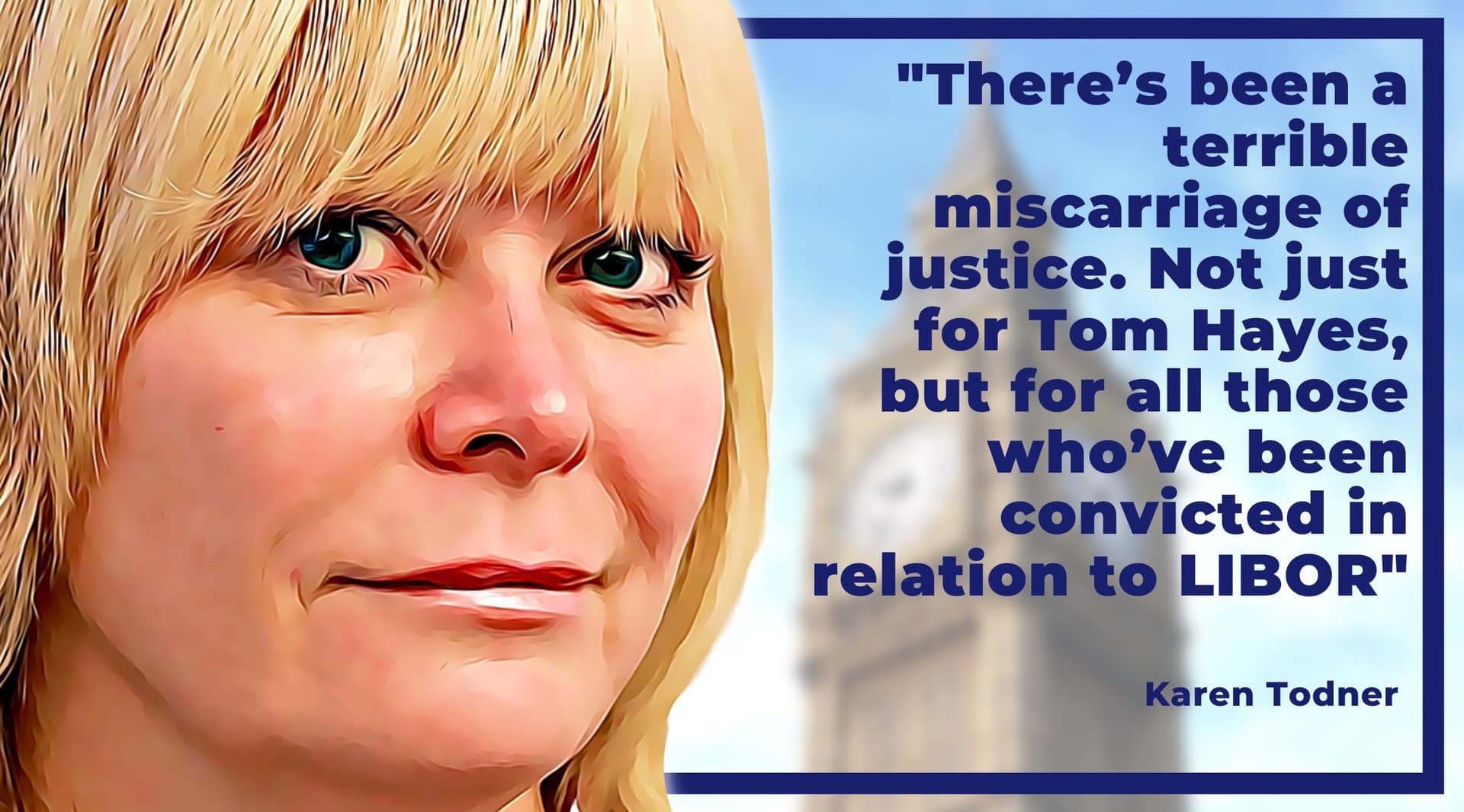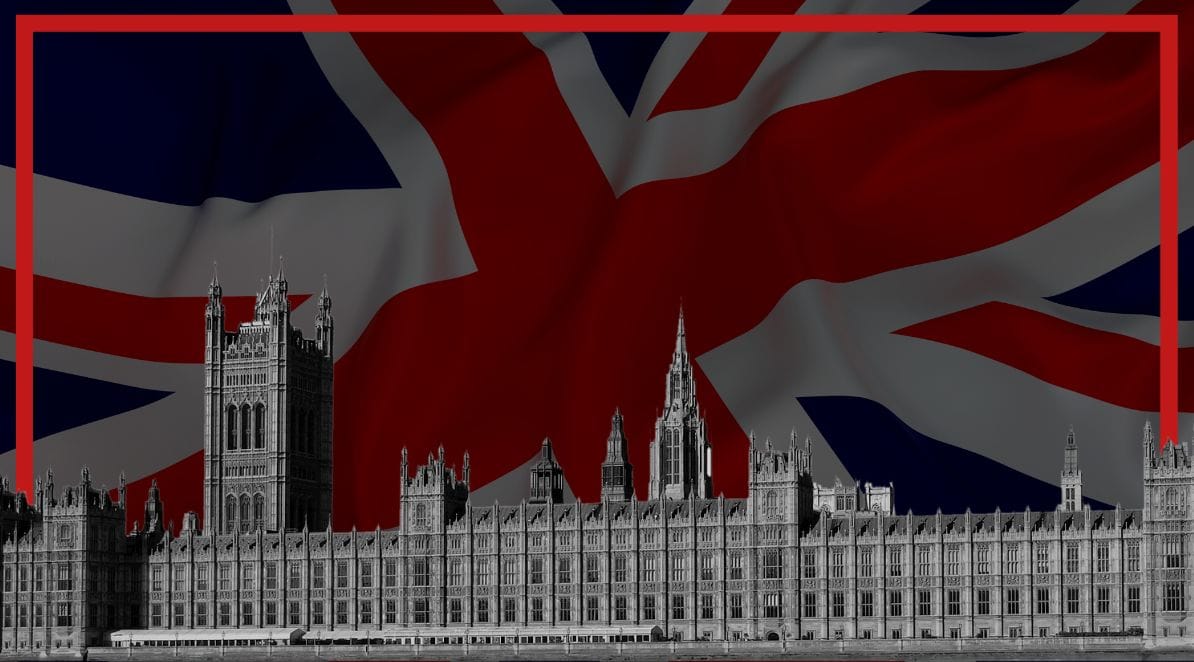In 2016, former banker and LIBOR trader Tom Hayes was in a very dark place. Having been found guilty of manipulating global interest rates in August 2015, he was just twelve months into an eleven-year sentence. Hayes was also spending his time at some of the toughest prisons in the country, sharing cells with murderers, armed robbers, and terrorists.
Separated from his wife Sarah, his marriage was also breaking down. He had a young son at home growing up without a father. Inevitably, this all took a massive toll on his physical and mental wellbeing. He was known to be contemplating suicide. Perhaps making the situation even more unbearable was the fact that Hayes was – and is – certain of his innocence. It was at the peak of his despair that he turned to prominent solicitor Karen Todner.
“I went to go and see Tom at Belmarsh,” Todner said. “He was in a terrible state at that point. I decided then that I would do what I could to help, and I’ve acted for him ever since.”
In the seven years since Todner first started representing Hayes, the evidence has grown to suggest that those convicted of rigging LIBOR rates have been victims of the most egregious miscarriage of justice in modern times. LIBOR is a benchmark interest rate that underpinned trillions of dollars in financial products. It was calculated daily by taking the average rate submitted by a panel of the world’s major banks.
The US now accepts that submitting a “high” or “low” LIBOR rate depending on commercial positions was never against the rules. In the UK, we're still bound by the absurd decision of Cooke in the Hayes trial: a decision he came to against all expert advice. https://t.co/fExkFRxu4P
— Harry Clynch (@clynchharry) September 6, 2022
In the years before the financial crisis, there was a common understanding that banks were allowed to take commercial interests into consideration when calculating their rate. This meant that traders, such as Hayes, were able to request higher or lower rates depending on what might advantage their open trading positions. This was never against the rules, with regulatory bodies such as the Financial Conduct Authority (FCA) refusing to sanction traders for the practice despite the criminal charges that were initiated by the Serious Fraud Office (SFO).
Despite this, Todner told Disruption Banking that the judge at Hayes’ trial, Mr. Justice Cooke, ruled otherwise. “The judge made a ruling that any commercial interest at all that was taken into account when submitting a LIBOR rate was unlawful,” she said. “That would normally be a decision that should be left to the jury. But the judge just made this ruling and said “this is my ruling and this is how it’s to be done.” This ruling was then used in the following cases of others prosecuted for the same offence.”
It’s a strange legal position for the courts to find themselves in. How can traders, who work for profit-making entities, be retrospectively criminalised for taking commercial interests into account? That is, after all, the entire point of their job. Todner believes there’s a simple enough answer. “The rulings made in the first trial were just wrong.”
This unfortunately is not true. In the Libor trials retrospective rules, introduced by the courts, meant that considering commercial interest rendered truthful submissions false. This change was entirely to fit an outcome. Courts in the USA and rest of the world do not agree. https://t.co/81n5komcP8
— Tom Hayes (@robilypj) March 22, 2023
One of the reasons Hayes and his ex-wife sought Todner’s help – aside from the fact that she is internationally renowned as a criminal defence and human rights lawyer – is that she is a specialist in representing people with autism. High-profile cases that she has worked on include those of Gary McKinnon and Lauri Love, who were both accused of hacking military computers in the United States. Hayes was only diagnosed with autism about a month before his trial, but Todner believes that “it wasn’t dealt with properly” and this adds another layer to the miscarriage of justice.
“The judge essentially just said “I’m not interested. I’m not going to make any directions about it or give the jury an explanation.” Some of the answers Tom gave, because of his autism, needed a bit of explanation,” Todner said.
One of Hayes’ defences was that everything he did was authorised and encouraged by his senior management. Todner told Disruption Banking that, when he was being cross-examined on this point, “he was asked: are you suggesting you’re just like a sheep? And his response was something like “I haven’t got four legs and a woollen coat.” Because of his autism, he didn’t necessarily get the irony – the sarcasm just passed him by.”
But as the jury wasn’t informed about this, this helped the prosecution to construct a narrative that Hayes was simply an arrogant banker who held the court in contempt. Particularly in the aftermath of the 2008 financial crash, when there was huge public pressure for those responsible to be held accountable, Hayes’ apparent manner made him a useful cartoon villain.
“The jury had no context of his condition or how he can act,” Todner said. “Some of his answers in court, without this context, could be very easily misread.” She also believes Hayes’ case raises wider questions about the way the criminal justice system treats those with autism. “There’s a whole group of people who’ve been treated very badly in the judicial system, because people just don’t understand how to deal with it. I’m not saying that autism is a defence or excuse – but it’s something that needs to be appreciated, understood, and put in context.”
The criminal justice system is failing autistic people, say researchers at @ARC_Cambridge.
— Cambridge University (@Cambridge_Uni) March 15, 2022
A survey of lawyers found an overwhelming majority of their clients were not provided with adequate support or adjustments: https://t.co/iTEP7e6Gj7#Autism @RachelSlavny @SBaronCohen
Reflecting on how this miscarriage of justice came about, Todner recalled the public mood in the fallout from the 2008 crash. “It was a perfect storm. You had politicians saying we’ve got to prosecute people for LIBOR. There was real pressure to find somebody so they could say they were dealing with it and responding [to the financial crisis]. Tom was that person. And it destroyed his life.”
Hayes and Todner are hopeful that, after almost a decade, the courts may finally be prepared to overturn their original decision. A committee at the Criminal Cases Review Commission (CCRC) is currently looking at Hayes’ case is due to meet at the beginning of May. They could then refer Hayes back to the Court of Appeal. Especially given the fact that the LIBOR convictions of Matt Connolly and Gavin Black having have recently been overturned in the United States, there’s every chance that Hayes could be successful in his appeal – potentially by the end of the year.
“It’s been a long journey,” Todner said. “But I’m really hopeful that we’ll get there soon.”
Author: Harry Clynch


















One Response
An insightful and well crafted expose of an obvious perversion of justice from Harry, certainly worth a read.